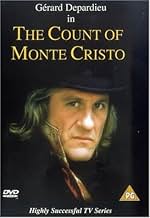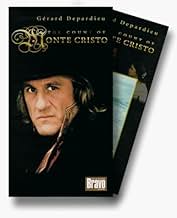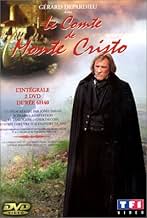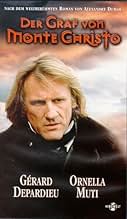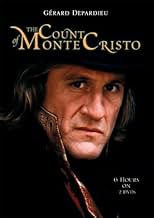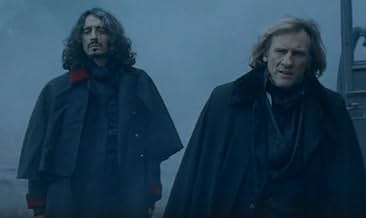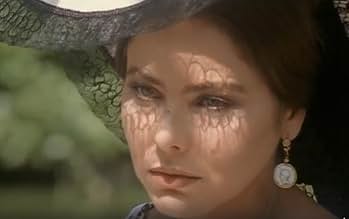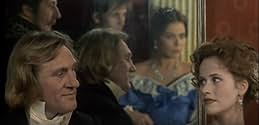O Conde de Monte Cristo
Título original: Le Comte de Monte Cristo
- Minissérie de televisão
- 1998
- 1 h 40 min
AVALIAÇÃO DA IMDb
7,8/10
7,4 mil
SUA AVALIAÇÃO
Edmond Dantes é injustamente enviado para a prisão por 18 anos. Ele foge para recuperar sua noiva Mercedes e se vingar de seu nêmesis, Mondego.Edmond Dantes é injustamente enviado para a prisão por 18 anos. Ele foge para recuperar sua noiva Mercedes e se vingar de seu nêmesis, Mondego.Edmond Dantes é injustamente enviado para a prisão por 18 anos. Ele foge para recuperar sua noiva Mercedes e se vingar de seu nêmesis, Mondego.
- Prêmios
- 3 vitórias no total
Explorar episódios
Avaliações em destaque
Le Comte de Monte Cristo is well done. Actors are made for their roles. Gerard Depardieu is fabulous in the role of count and Sergio Rubini makes the servant Bertuccio alive. In the novel Bertuccio was in a much smaller role. In the TV-version other characters have got bigger roles. It's a good thing that not only the count of Monte-Cristo is showing. I really recommend this beautifully done TV-film for everyone. After seeing this I started to appreciate the French in the film world in a very different way.
Alexander Dumas's immortal novel has been treated to many film and television adaptations, but until you watch the 1998 miniseries, you've never really seen it. If you've read the novel-I have an English-translated copy on my shelf-you know that it's impossible to condense every plot point into a two-hour movie, which is why the other adaptations have stuck to the main storyline and cut out the intricate plans of the title character. In this six-hour miniseries, it's almost like reading the book! And, since this is a French version, who else but the incomparable Gérard Depardieu could tackle the leading role?
From the opening scene, with Gérard's son Guillaume portraying him as a young man, you'll be purely captivated. To be brief, Guillaume is innocently involved in a treasonous plot, and before he can marry his sweetheart, Naike Rivelli, he's arrested, tried, and locked away in an Alcatraz-type prison on an island. Imprisoned for eighteen years, Guillaume becomes Gérard, and Gérard vows to escape and exact his revenge on those who did him wrong. Many people have cited the escape scene as their favorite, and it is incredibly exciting in this version. And, since this is a six-hour miniseries, Gérard's friendship with his fellow inmate, Georges Moustaki, isn't rushed like it sometimes is in other movies. Nothing is rushed in this adaptation, allowing the audience to understand every detail and complex plot point, and enjoy the execution of each scene.
How is it possible for Gérard Depardieu to be so wonderful? This role calls for so much, and some who've taken it on have been more successful than others. There's physical acting in addition to the highly dramatic scenes, a need to fit in to the time period, and the ability to take on many different disguises without being comical. Revenge, remorse, sympathy, determination, relief, and intelligence are just a few of the qualities the actor needs to embody. If he doesn't, he'll never convince the audience to root for him as he systematically ruins the lives of others. Gérard puts more of himself into this role than in any of the other thirty films I've seen. It's truly an experience to watch him in this miniseries. It feels that he, and not Alexandre Dumas, wrote the story, and that he, and not Josée Dayan, who directed the camera and his fellow actors to completely revolve around him. He is Edmond Dantès. His expressions are mesmerizing, and at times heartbreaking. He delivers his lines with such passion, understanding, and sensitivity, it's as if he's signed "Finis" in ink so that no other actor will bother to take on another remake.
Jean Rochefort and Pierre Arditi make the most of their deliciously villainous roles, and Ornella Muti plays the older version of Naike's role, Edmond Dantès's sweetheart. In a truly family affair, Gérard's daughter, Julie plays Ornella's daughter, and it's very cute to see their scenes together. You can practically feel his pride that both his children are acting alongside him in this masterpiece. Even if you're partial to the 1975 version, I recommend you watch this one. It's so much more thorough, it'll feel like a different story, so you won't be betraying Richard Chamberlain by liking both versions.
From the opening scene, with Gérard's son Guillaume portraying him as a young man, you'll be purely captivated. To be brief, Guillaume is innocently involved in a treasonous plot, and before he can marry his sweetheart, Naike Rivelli, he's arrested, tried, and locked away in an Alcatraz-type prison on an island. Imprisoned for eighteen years, Guillaume becomes Gérard, and Gérard vows to escape and exact his revenge on those who did him wrong. Many people have cited the escape scene as their favorite, and it is incredibly exciting in this version. And, since this is a six-hour miniseries, Gérard's friendship with his fellow inmate, Georges Moustaki, isn't rushed like it sometimes is in other movies. Nothing is rushed in this adaptation, allowing the audience to understand every detail and complex plot point, and enjoy the execution of each scene.
How is it possible for Gérard Depardieu to be so wonderful? This role calls for so much, and some who've taken it on have been more successful than others. There's physical acting in addition to the highly dramatic scenes, a need to fit in to the time period, and the ability to take on many different disguises without being comical. Revenge, remorse, sympathy, determination, relief, and intelligence are just a few of the qualities the actor needs to embody. If he doesn't, he'll never convince the audience to root for him as he systematically ruins the lives of others. Gérard puts more of himself into this role than in any of the other thirty films I've seen. It's truly an experience to watch him in this miniseries. It feels that he, and not Alexandre Dumas, wrote the story, and that he, and not Josée Dayan, who directed the camera and his fellow actors to completely revolve around him. He is Edmond Dantès. His expressions are mesmerizing, and at times heartbreaking. He delivers his lines with such passion, understanding, and sensitivity, it's as if he's signed "Finis" in ink so that no other actor will bother to take on another remake.
Jean Rochefort and Pierre Arditi make the most of their deliciously villainous roles, and Ornella Muti plays the older version of Naike's role, Edmond Dantès's sweetheart. In a truly family affair, Gérard's daughter, Julie plays Ornella's daughter, and it's very cute to see their scenes together. You can practically feel his pride that both his children are acting alongside him in this masterpiece. Even if you're partial to the 1975 version, I recommend you watch this one. It's so much more thorough, it'll feel like a different story, so you won't be betraying Richard Chamberlain by liking both versions.
I first saw this at christmas about 3 years ago. I was ill in bed with flu and just wanted to die. I got up for a change of scenery and put the tv on. This was on. I spent the next three days setting the alarm for 3pm and getting up out of my death bed to watch this compelling series. I then found it on DVD, and bought it (the book was included and I have been reading that too). THe story is compelling and the characterisations by all of the actors are amazing. THe detail is fantastic and even though I don't normally "do subtitles" I have watched the entire series several times, finding something new and even more entertaining each time. I would recommend it to anyone - this would make kids WANT to learn french in school so they could watch it without the subtitles.
Eight hours allows for a greater presentation of the many subplots and complexities of the storyline. Depardieu (once you get past his size) is excellent as the Count, a man who, as the reviewer from Amazon says, exchanges one prison for another, a prison of his own hatred. The cast is general is very good and convincing, with Ornella Muti certainly the definitive Mercedes. Set design and production values are excellent.
I have only two criticisms. The first and more minor one is that even this long adaptation doesn't have everything. They couldn't, of course, portray everything -- the book itself is well over 1,000 pages and in truth has padded sections -- but some worthwhile aspects of the story were cut, most notably early sequences with the Abbe Faria (who teaches Dante how to read and write) a very famous part that's usually included in dramatizations of the story. The ending, too, is happier than Dumas's. (I should add that some sequences were very sensibly cut).
A more serious criticism is that Dantes's character is too soft. Depardieu is a fine actor but his portrayal allows Dantes to come off far more sympathetic than I think Dumas intended. The coldness and bloodthirstiness of the Count is not emphasized as much as it might (one sequence at an execution has a very different spin from the way it's presented in the book, for example), nor is the extent of his hatred. This is a real flaw, partly because it makes light of the theme of the story, the effect of revenge on the revenger, and partly because the climax is not as effective if we're already on Dantes side. The flaw here is not with Depardieu, who does his job admirably, but rather with the screenwriter and director.
As such, I can't call this the definitive version -- a little more courage on the screenwriter and director's part would've done wonders. Still, it's probably the best we're going to get. It's hard to imagine anybody else lavishing this kind of care and attention on the story.
I have only two criticisms. The first and more minor one is that even this long adaptation doesn't have everything. They couldn't, of course, portray everything -- the book itself is well over 1,000 pages and in truth has padded sections -- but some worthwhile aspects of the story were cut, most notably early sequences with the Abbe Faria (who teaches Dante how to read and write) a very famous part that's usually included in dramatizations of the story. The ending, too, is happier than Dumas's. (I should add that some sequences were very sensibly cut).
A more serious criticism is that Dantes's character is too soft. Depardieu is a fine actor but his portrayal allows Dantes to come off far more sympathetic than I think Dumas intended. The coldness and bloodthirstiness of the Count is not emphasized as much as it might (one sequence at an execution has a very different spin from the way it's presented in the book, for example), nor is the extent of his hatred. This is a real flaw, partly because it makes light of the theme of the story, the effect of revenge on the revenger, and partly because the climax is not as effective if we're already on Dantes side. The flaw here is not with Depardieu, who does his job admirably, but rather with the screenwriter and director.
As such, I can't call this the definitive version -- a little more courage on the screenwriter and director's part would've done wonders. Still, it's probably the best we're going to get. It's hard to imagine anybody else lavishing this kind of care and attention on the story.
One could say I am an old coot, geezer, at the age of 71. This wonderful series, starring the great Gerard Depardieu, pulled me back to my childhood at about eight years old. The two librarians in my little home town in Louisiana always pushed me to read books that were at least two grades ahead. At the end of the school year we were given the usual Summer Reading List. Presenting mine to the local librarians, they suggested a novel by Alexander Dumas, The Count of Monte Cristo. I had never actually read a "novel" of that size. I was a bit over- come, but began to read this book right then and there, sitting in a bay window overlooking the little river that flowed past the library's huge windows. That experience changed my life from a casual reader to a dedicated and life-long lover of books. I learned that Dumas was French and had written many other books. I read them all that summer. Then on to Victor Hugo, Balzac, George Sand, and others, all recommended by those lovely ladies in the local library. I have seen almost every film adaptation of The Count, going back to the 1934 version with Robert Donat to the last one with Guy Pierce. THIS one, with Depardieu,is my favorite. Although many liberties are taken, as usual with movie producers and directors, it still is an exciting and involving tale. Dumas' story is so sturdy that any injury visited upon it would be only superficial. I found myself an eight year old all over again. Unlike some adaptations of Dumas' novels, this one had very little swash and even less buckle, being more character driven and fueled by last minute escapes and near fatal outcomes. The ending, as several other comments express, is a bit too up-beat, but so what? Life is full of wonderful and unexpected joys. Watching this made-for-television series was one of them. AND I found it on DVD so I can watch it over and over.
Você sabia?
- CuriosidadesGérard Depardieu also plays Edmond's father during the flashback scenes, where the young Edmond is played by his own son, Guillaume Depardieu.
- ConexõesFeatured in Voyance et manigance (2001)
Principais escolhas
Faça login para avaliar e ver a lista de recomendações personalizadas
- How many seasons does The Count of Monte Cristo have?Fornecido pela Alexa
Detalhes
- Data de lançamento
- Países de origem
- Central de atendimento oficial
- Idioma
- Também conhecido como
- The Count of Monte Cristo
- Locações de filme
- Empresas de produção
- Consulte mais créditos da empresa na IMDbPro
Contribua para esta página
Sugerir uma alteração ou adicionar conteúdo ausente

Principal brecha
By what name was O Conde de Monte Cristo (1998) officially released in India in English?
Responda

